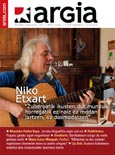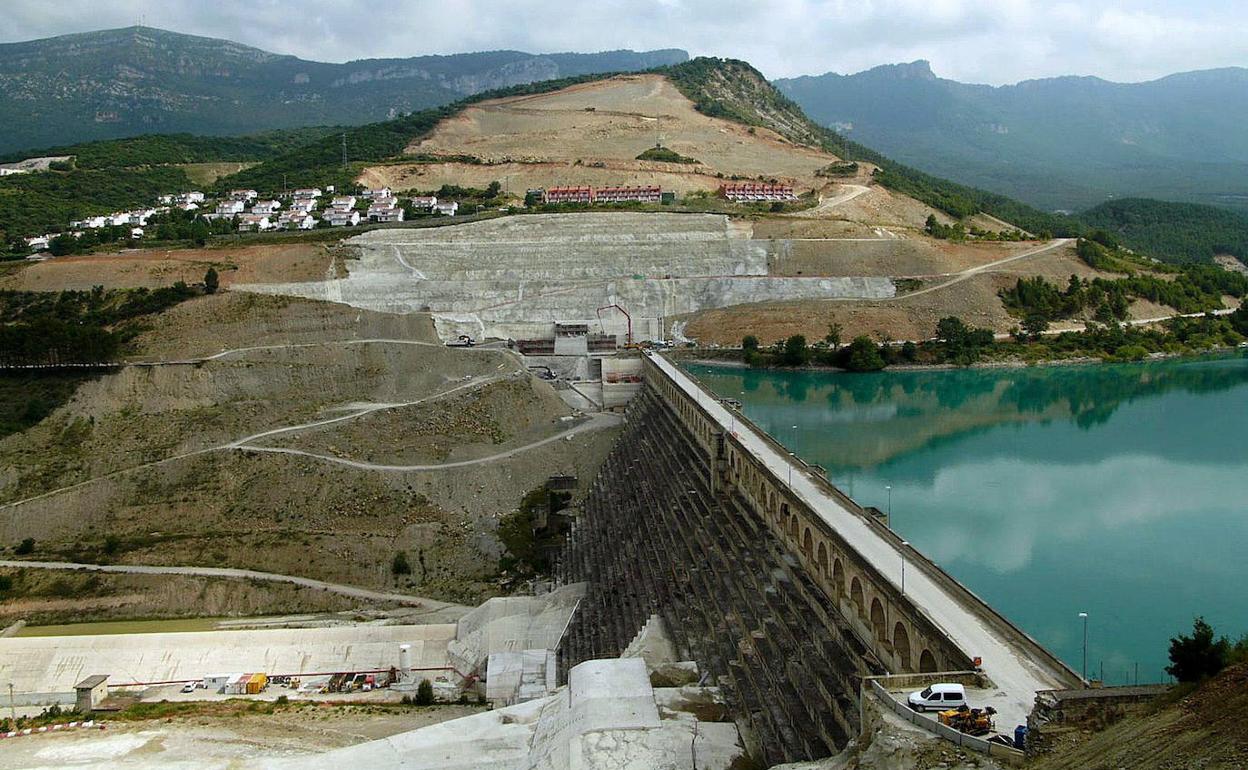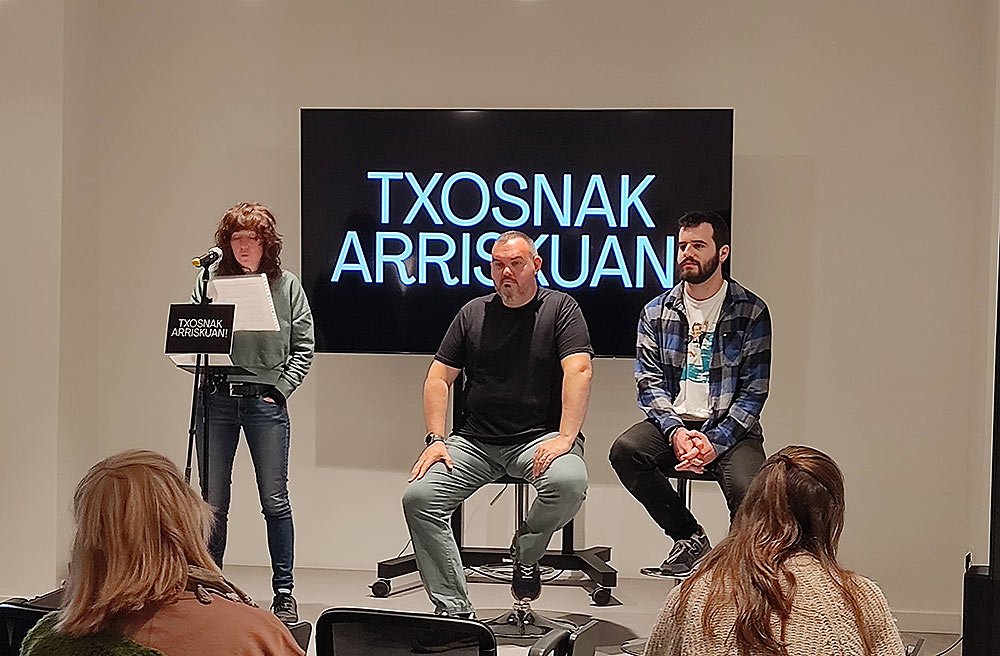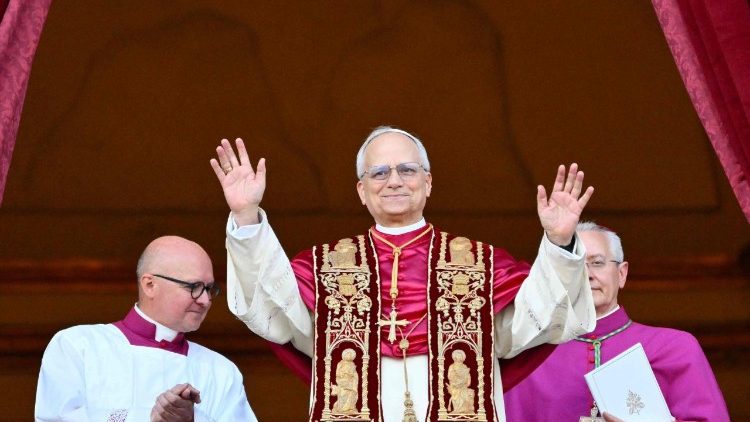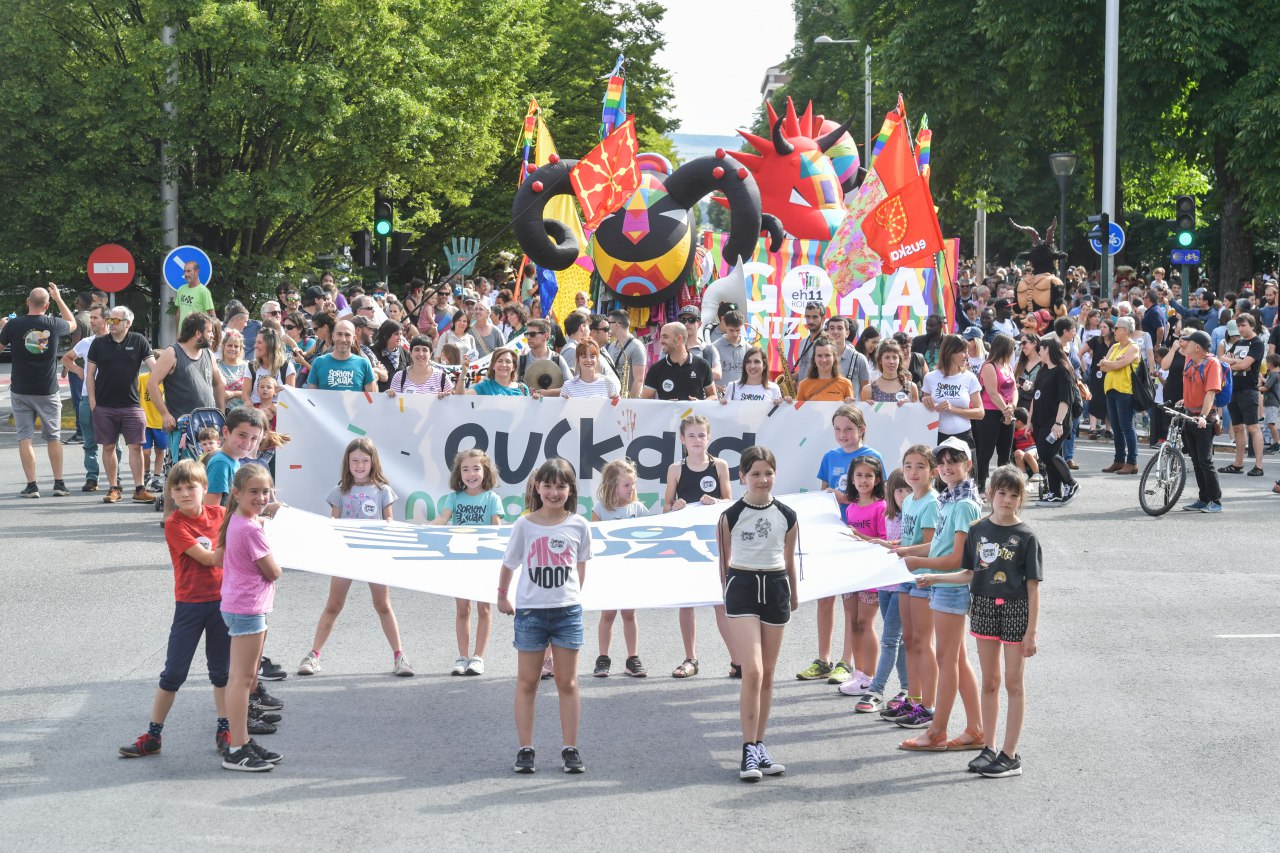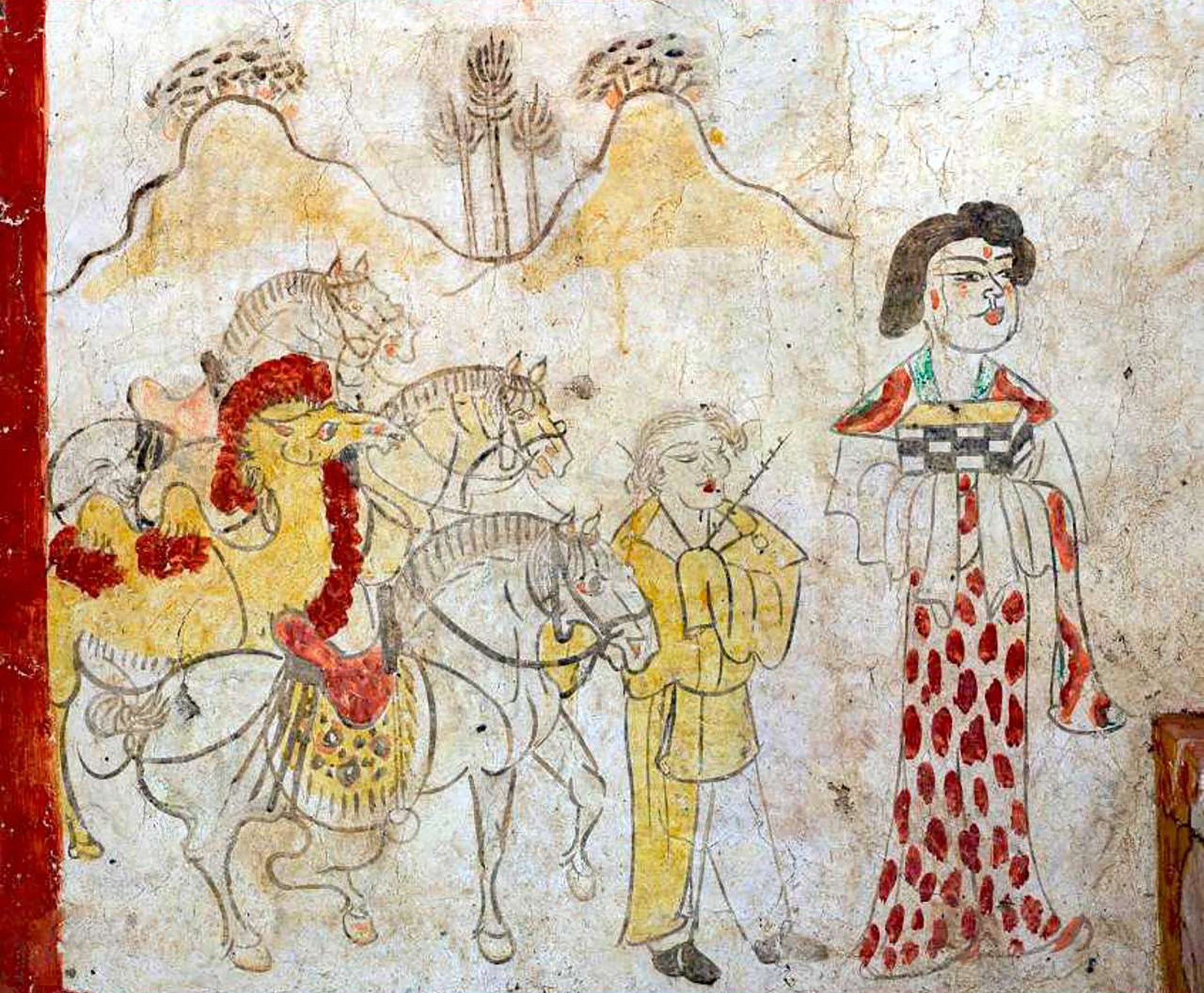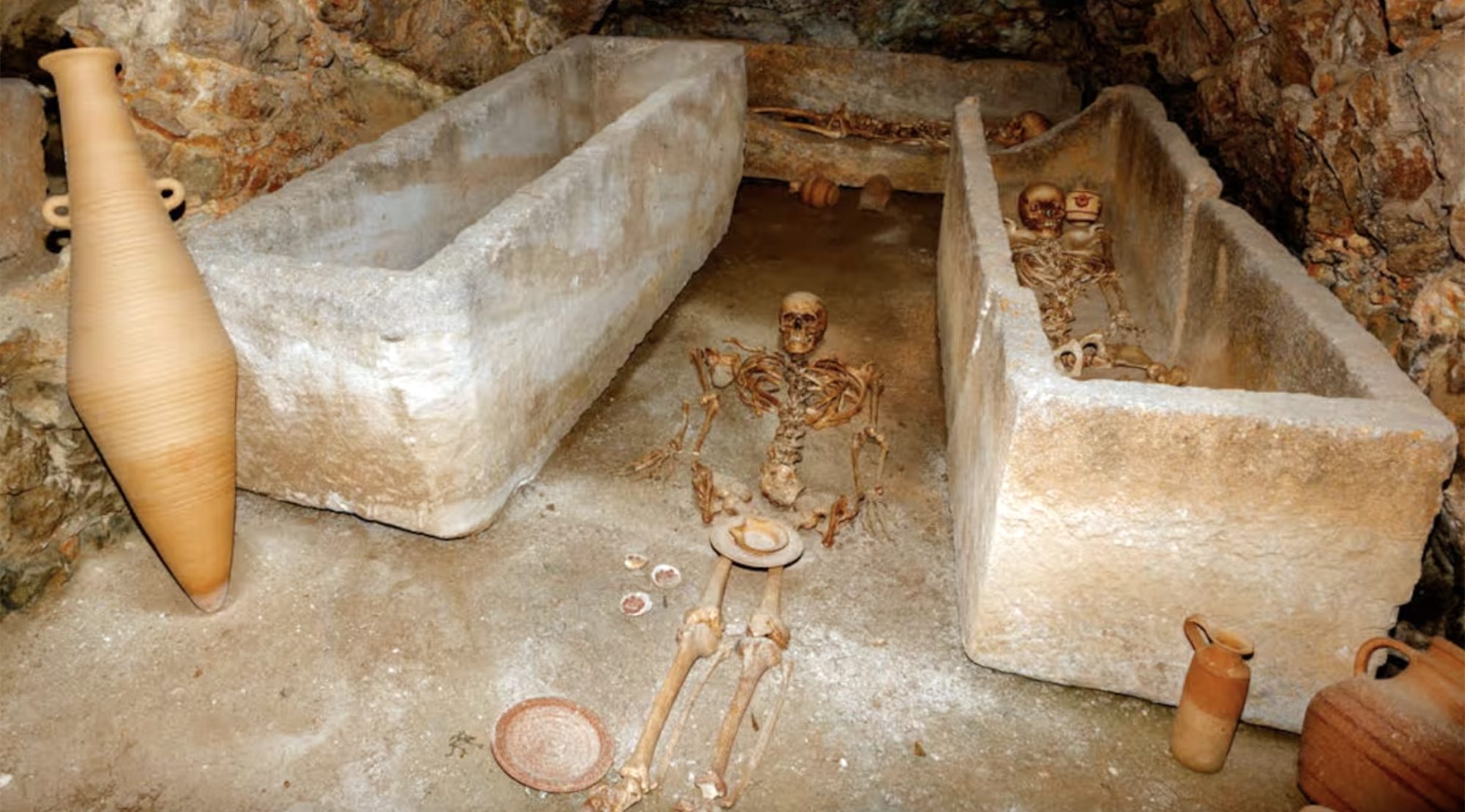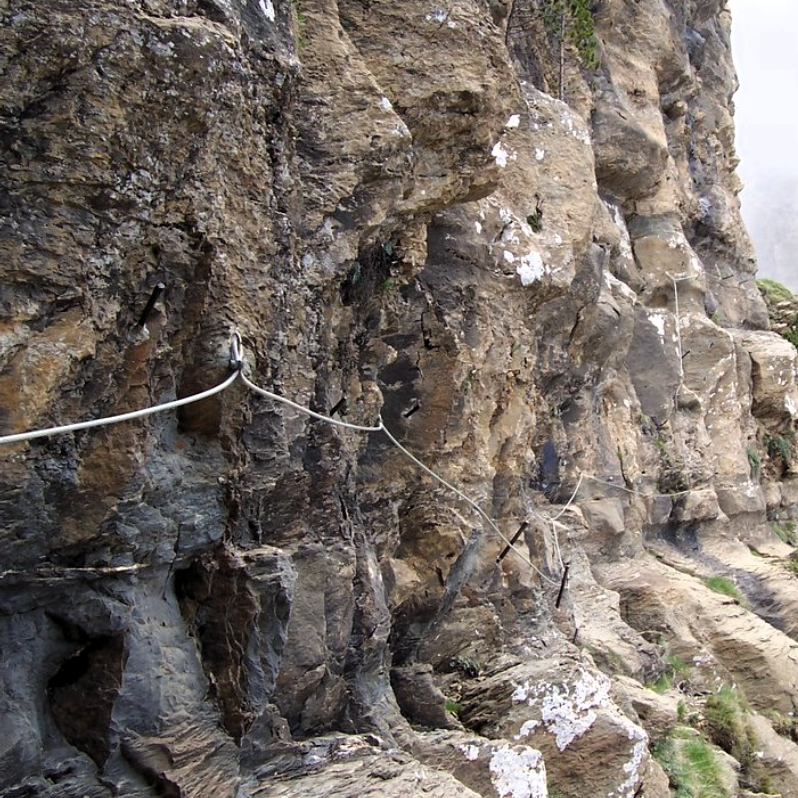"Eneko, Euskara is a laboratory"
- Why is it common that it was once unbelievable? Why is it unbelievable what was once common?
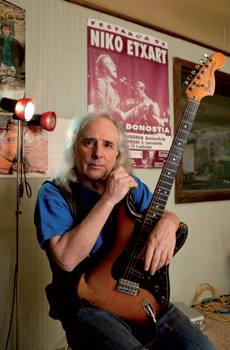
You went to Paris before singing “...Banüazü...”
Two years after its creation. Our father found a job there in the service of the church, and I returned to the Basque Country only from military service. Whether I like it or not, it is those who live and see in childhood and youth that mark the character, and today I attach more and more importance to the preservation of this Parisian mentality. When I left Paris behind to settle in the Basque Country, I had to leave more than Paris aside to get along with the people here. That curiosities of necessity are more easily accepted by the artist. But for example, I owe the initiative and the courage to do things to Paris. Here I have been creating groups, albums or projects, the young people of my time here lacked the fuse. Cost, lack of acceptance... They always had an excuse. I, on the other hand, always thought that with my Parisian mentality everything was possible. Today, the mentalities have been leveled, but 40 years ago the Basque people were very humble.
It is not always easy to pass on the Basque consciousness to a child in the Basque Country, but in Paris...
Our father has worked in the capital for 37 years, but he has lived in Paris as if it were Alcirükün. At home he spoke Basque, the bonnet went to the street in his head, and I'm sure he never had the curiosity to go to the Louvre. No, the greed of our father's week-end was to go to the Basque Country. That's where I met the manexas, that's where I got involved with the Southerners, and a little later with the refugees. This has inspired my passion for the Basque Country, although my militant conscience has come much later. The way things are, I've been a golfer for a long time. I went to school and all I cared about was music and football. But because we used to live in Alcierürüküra, because we had a Basque atmosphere in the house, and because we had entered the Basque House every weekend, I lived in a very Basque atmosphere, even though the house was in the area of Montparnasse.
When you decided to return to the Basque Country from your military service to the countryside, did you not think that it was better than Paris to fulfill your dreams?
I've been thinking about this for a long time. When I was 14, I knew I was going to be a musician or a singer. In my mind, high, I could clearly see that singing in Basque was for my pleasure, but if I wanted to live there the only option was to be a French singer. I played in a group of older members than myself in Paris and in the neighborhood where we were successful in training at the age of 15-16. Imagine that a businessman from the famous record company of Eddy Barclay had a look at me and offered me a contract to pursue a career as a French singer. It was the only year in my life that I was paid. Like Nicoleta or Michel Sardou, I was in the future French singers of choice. But it was 1972, the hippie movement was in full swing, and they constantly repeated this idea of returning to one’s own land, and above all that everything was possible outside the capital. One day I decided that I was going to be a Basque singer, and with my shoulder changed, I said goodbye to the Barclays, and since then I have been on my own.
If you had been a French singer, you would have wanted to listen to rock.
At that time Pantxoa and Peio, Manex Pagola and folk were fashionable. I had a folk group called Nueva Sangre, we also sang a capela with Jean Mixel Bedaxagar, but I knew that to live one needed money, and the easiest way to do it was to dance. In those dances, I needed rock to move my butts and that’s why I started to work in Basque danceable rock. I also sang rock in Paris in Basque, but when you were young you were radical and rock was like that. I knew that rock here looked bad, that the Basque was very conservative. For some, to rock in Basque was to discredit and betray the Basque language, a mortal sin. We've also been punctured by the wheels of the car! Despite this mentality of our previous generation, we had young people on our side, and luckily we moved people into the balance. Anje Duhalde and I have been credited with pioneering Basque rock and it is a very beautiful title from today’s point of view, but in those years it was not always pleasant.
Is it a coincidence that Basque rock originated from the Basque periphery? Josu Zabala also often says that the Hertzaina could only have originated in Vitoria.
It's not a coincidence. The courage I owe to the Parisian mentality has led me to create Basque rock, and Paris is the periphery for the Basque Country. It was underground. Fucking with the New Blood or singing traditional songs was much more successful than doing rock. I did not plan to create Basque rock. I made the plans to be a professional Basque singer. For this you have to get tired of the mind and it was very logical that if I wanted to do the dance in Basque, I would sing rock in Basque.
To be professional, you’ve had to get tired not only of your mind, but also of your body.
With Minxoriak I did 170 concerts a year, in addition to the ones I did as Niko Etxart. On one of my normal summer days, for example, I would give traditional Larzabal songs during the midday aperitif, a concert in the afternoon as Niko Etxart in the Basauri football field, and a dance with Minxoriak in the evening in Barakaldo. I've been on that march drinking multiple, sleeping in the car... I've done this for a long time, ten years without tai. I’ve never had much trouble on the road, but the last two years have been tough. There was a bult that I had, and I also had the indispensable help of someone to ask for a drink at the inn. I was a zombie. One morning in 1986, when I came home from Bilbao, the car gave me a full tour of the motorway. Neither I nor the car had anything, but I decided to stop dancing, set up my own studio and relax my life.
Why do we underestimate the dance today? Why are the seats empty?
Effects of the urban mentality. It's Eneko's great fault to underestimate the Berber musician. In our geography, the dance has been an incredible tool to spread the Basque song. And people were asking for it. But what has been fashionable in this friendly, sweet and slutty Basque Country soon becomes unfashionable. When I ask my kids what the other dance group in town is, they don't know. On the other hand, they always know who has given the concert, even if it is a small group. The prestige of the dance in our time is currently in the concert.
The concert groups also talk about the crisis, high.
An Eneko musician, an artist, has no right to cry. That's a golden rule I always try to keep. Of course, I also see that multiple parameters have changed, that the benefits that come out of the discography are not the same, but I have never cried and I do not feel like crying. The routine I need to live still works for me, but it doesn’t mean that I don’t have solidarity with other musicians. On the contrary. If everyone tries to save himself, there is a danger of strangling everyone. But I am optimistic about myself, and although I am sometimes too optimistic, I totally agree with what the French writer Alphonse Allais said. “A man who knows how to be happy with a simple illusion is much more capable than one who is disappointed with reality.”
For example, the one who doesn’t cry will tell you that he doesn’t eat even more.
What I find abnormal is that when people come to ACDC or Bob Dylan BEC people are willing to pay 80, 100, 150, or 200 euros and not want to pay 5 or 10 euros to see a Basque singer. Charging for admission to some places seems like a sin! In the north, people are used to paying for their entrance, and at least I feel much closer to those who have made this effort to listen to me. On the other hand, when we go to the South, even though it is very famous, it is an anonymity. For example, you will be placed in the kiosk of Azpeitia, and since people do not pay, you see the public on the way from one hostel to another. I’m sure, high, that if they brought an ultra-Spanish singer, they would charge the entrance and everyone would be standing there and paying attention.
It is always difficult to be a prophet in one’s own country.
I don’t mean that everyone in Biarritz knows Niko Etxart, but I know that anyone who enjoys Basque in the North knows who Niko Etxart is. As well, I know that Basques in the South have heard of Niko Etxart, but there are many sectors that don’t want to hear Basque either. So it’s true that I’ve been fashionable, I’ve released an album with a multinational, I’ve been in the 16th place of the 40 Principales charts, my songs have been heard in clubs all over Spain... But all this has always been seen as something promised from Madrid, and this use of Niko Etxart in Madrid has been experienced by me from far away, from Zubero. I see the world from Zubero, and that’s why it seems to me that I don’t become fashionable or unfashionable. I know, for example, that when I go to Harvard I will have some fans with my name, but fame or not fame, fashion or not fashion, it has been a long time since I took that into account. It doesn't matter to me. My luck and privilege is that I choose where and what song.
You have to sing early, high.
I take great pleasure in making music. Instinctively, instinctively, it's an easy task for me. I find it much more difficult to write words, but I also have the pleasure of being guided there. If I decide to whitewash the night for a song, you're sure it's not a cult. The bad thing is to start the work, but once it's done... Eneko is a Basque language laboratory. I know I'm not a great poet, but I think I know how to make a song. When I start to create music, I play it in a kind of English that doesn’t mean anything, and the funny thing is, until the album is recorded, my musicians only listen to that version. It’s amazing how the song takes on a different personality. Then some will like it and others will not. Some will still tell you that rock can only be done in English, not in French, not in Spanish, not in Serbo-Croatian, much less in Basque. But luckily, I have the stamp of acceptance.
You won’t be a great poet but you wrote the Peirot Pastoral of the Ürrüti Palace in 2002. How to explain the loss of the Basque language and the strengthening of the pastoral?
It's strictly related. In the north, the Basque concentration is low and works in a different way. Even in places where there is no patriotic tradition here, the Basque language has its place. Multiple organizers will tell you that it is still possible to mount a pastoral or masquerade because the village is fast. The main argument for pastoral work in some localities is that “if we don’t do it now, it will be too late”, “to show the outsiders who we can that we are fast”. This means that people are dealing with very short-term perceptions, that Basque is still widely used in the locality, but if we wait that this and that will no longer live here and shit. In Zubero, I see the loss of Basque in young people who are not aware or politicized. They live the language with nostalgia. They know that their parents spoke Basque, they are proud of it, but since they do not rationalize it in any other way, their involvement stops in pure nostalgia. Fortunately, in our villages, there are also more and more conscientious people, and it is beautiful to see that with the composition of the pastoral there is a popular dynamic. It is a way of showing that you live and that not only satisfies the nostalgic, but also the conscientious one makes his message pass.
In the Chinese province of Shanxi, in a tomb of the Tang dynasty, paintings depicting scenes from the daily lives of the dead are found. In one of these scenes a blonde man appears. Looking at the color of the hair and the facial expression, archaeologists who have studied the... [+]
Carthage, from B.C. Around the 814. The Phoenicians founded a colony and the dominant civilization in the eastern Mediterranean spread to the west. Two and a half centuries later, with the decline of the Phoenician metropolis of Tyre, Carthage became independent and its... [+]









